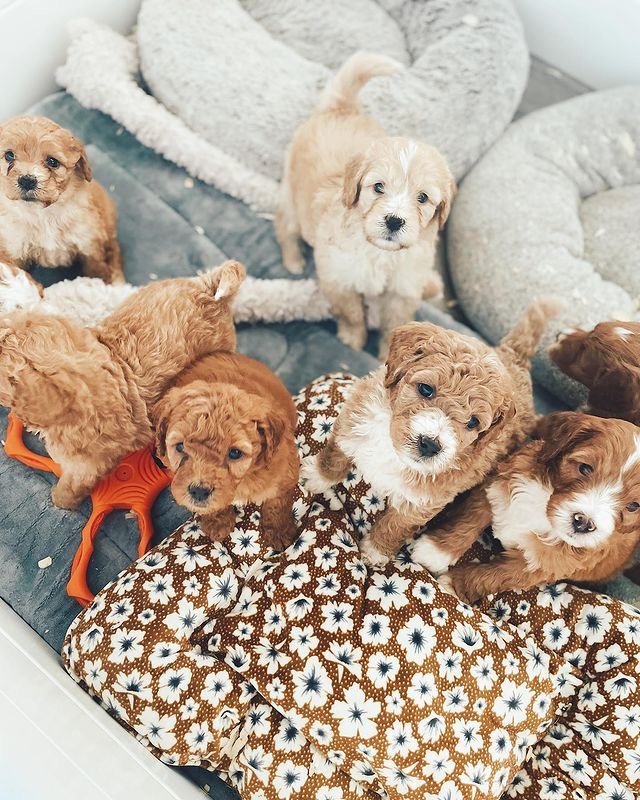
Labradoodle puppies naturally social with children
Labradoodle puppies are widely known for their friendly, gentle, and affectionate nature, which often makes them naturally social and good companions for children. Their hybrid heritage—combining the outgoing Labrador Retriever with the intelligent and playful Poodle—creates a temperament that is typically well-suited for family life, including households with kids. However, as with any breed or mixed breed, individual personalities and early socialization play crucial roles in how well Labradoodle puppies interact with children.
Key Takeaways
- Labradoodle puppies generally have a social and gentle temperament that suits children.
- Early socialization and supervised introductions promote positive interactions.
- Proper training teaches puppies boundaries and appropriate play behavior.
- Labradoodles’ intelligence and eagerness to please aid adaptability with kids.
- Consistent routines and respectful child behavior foster safe relationships.
Why Labradoodle Puppies Tend to Be Social with Children
Labradoodles inherit traits from two highly social and intelligent breeds:
- Labrador Retrievers are known for their friendly disposition and love of people, including children.
- Poodles bring intelligence, sensitivity, and adaptability, often responding well to gentle handling.
Together, these qualities make Labradoodle puppies predisposed to enjoy interaction and play with children.
How to Support Your Labradoodle Puppy’s Socialization with Kids
1. Start Early Socialization
Expose your puppy to different children, environments, sounds, and situations from a young age to build confidence and positive associations.
2. Supervise Interactions
Always supervise playtime to prevent accidental rough handling or overstimulation on either side.
3. Teach Appropriate Behavior
Train your puppy to respond to commands like “gentle” or “leave it” to manage excitement and teach respect.
4. Educate Children
Teach kids how to approach, touch, and play with puppies safely and kindly.
5. Provide Safe Spaces
Ensure your puppy has a quiet retreat where they can rest away from active play.
Signs Your Labradoodle Puppy Is Comfortable Around Children
- Approaches children willingly and playfully
- Remains calm and relaxed during interaction
- Responds positively to gentle petting and handling
- Engages in appropriate play without nipping or jumping excessively
Challenges to Watch For
Even social Labradoodles may experience:
- Overstimulation leading to jumping or mouthing
- Sensitivity to loud noises or sudden movements
- Protective behavior if feeling threatened or anxious
Consistent training and supervision help mitigate these issues.
Top Goldendoodle Breeders Known for Well-Socialized Puppies
Selecting a puppy from breeders who prioritize temperament and socialization increases the likelihood of a naturally social Labradoodle puppy.
Here is a list of reputable Goldendoodle breeders with strong socialization programs:
- Good Day Doodles – North Carolina
- Tampa Goldendoodles – Florida
- River Valley Doodles – New York
- Golden Liberty Doodles – Texas
- Premier Doodles – South Carolina
- Angel View Doodles – Massachusetts
- Coastland Goldendoodles – California
- Doodle Creek – Ontario, Canada
- S&S Goldendoodles – Indiana
- Fox Creek Farm – West Virginia
Health Considerations Affecting Behavior
Sometimes underlying health issues like luxating patella can cause discomfort that affects a puppy’s behavior around children, making regular vet checkups important.
Conclusion
Labradoodle puppies are naturally social and affectionate with children, especially when supported by early socialization, training, and supervised interactions. Their friendly and intelligent nature often makes them excellent family pets who enjoy playful and gentle relationships with kids. Providing a safe and structured environment helps nurture these bonds for a lifelong friendship.
Frequently Asked Question
Are Labradoodle puppies good with young children under 5 years old?
Yes, Labradoodle puppies typically get along well with young children under 5 years old. However, because young children can be unpredictable, supervision and gentle introductions are crucial to ensure safe and positive interactions for both the puppy and the child.




